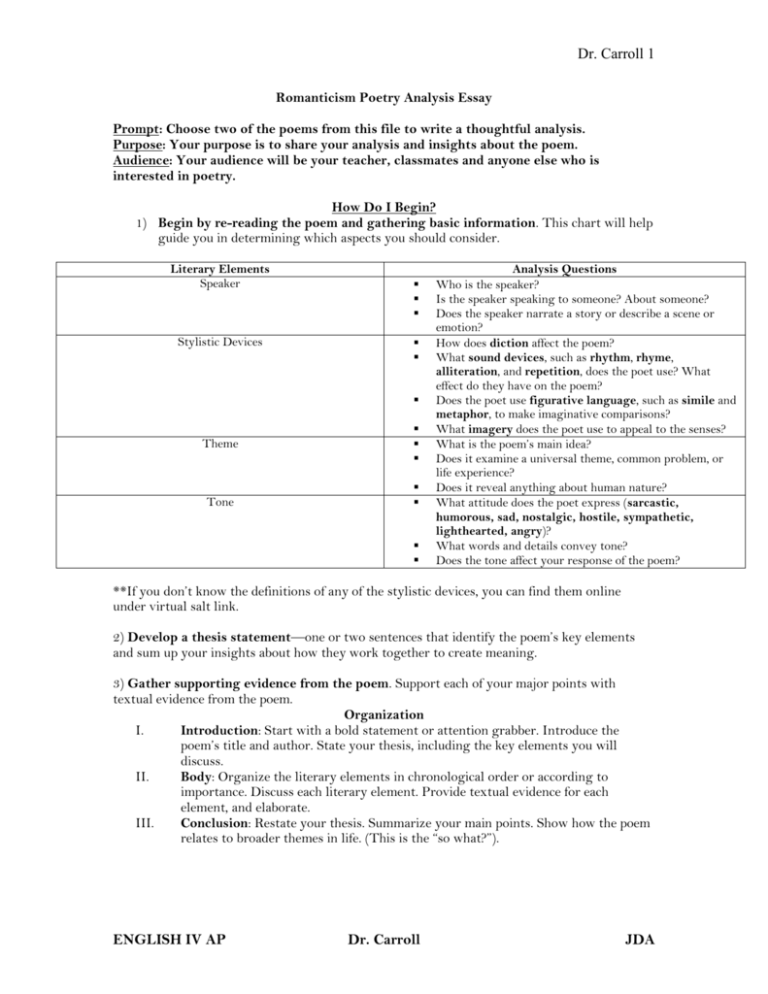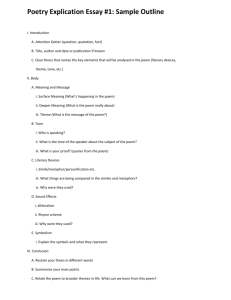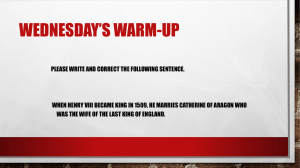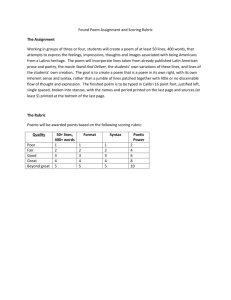Romanticism Poetry Analysis Essay
advertisement

Dr. Carroll 1 Romanticism Poetry Analysis Essay Prompt: Choose two of the poems from this file to write a thoughtful analysis. Purpose: Your purpose is to share your analysis and insights about the poem. Audience: Your audience will be your teacher, classmates and anyone else who is interested in poetry. How Do I Begin? 1) Begin by re-reading the poem and gathering basic information. This chart will help guide you in determining which aspects you should consider. Literary Elements Speaker Stylistic Devices Theme Tone Analysis Questions Who is the speaker? Is the speaker speaking to someone? About someone? Does the speaker narrate a story or describe a scene or emotion? How does diction affect the poem? What sound devices, such as rhythm, rhyme, alliteration, and repetition, does the poet use? What effect do they have on the poem? Does the poet use figurative language, such as simile and metaphor, to make imaginative comparisons? What imagery does the poet use to appeal to the senses? What is the poem’s main idea? Does it examine a universal theme, common problem, or life experience? Does it reveal anything about human nature? What attitude does the poet express (sarcastic, humorous, sad, nostalgic, hostile, sympathetic, lighthearted, angry)? What words and details convey tone? Does the tone affect your response of the poem? **If you don’t know the definitions of any of the stylistic devices, you can find them online under virtual salt link. 2) Develop a thesis statement—one or two sentences that identify the poem’s key elements and sum up your insights about how they work together to create meaning. 3) Gather supporting evidence from the poem. Support each of your major points with textual evidence from the poem. Organization I. Introduction: Start with a bold statement or attention grabber. Introduce the poem’s title and author. State your thesis, including the key elements you will discuss. II. Body: Organize the literary elements in chronological order or according to importance. Discuss each literary element. Provide textual evidence for each element, and elaborate. III. Conclusion: Restate your thesis. Summarize your main points. Show how the poem relates to broader themes in life. (This is the “so what?”). ENGLISH IV AP Dr. Carroll JDA Dr. Carroll 2 Poetry Analysis Scoring Rubric 9 High Score 98-100 8 High Score 95-97 7 Medium-High Score 90-94 6 Medium High Score 85-89 5 Medium Score 80-84 4 Medium-Low Score 75-79 3 Medium-Low Score 70-74 2 Low Score 60-64 1 Low Score 0-59 0 No Score ENGLISH IV AP Provides insightful analysis of the literary devices the author uses. Offers a clear and concise analysis of figurative language, theme and tone. Sophisticated control of language; Includes appropriate and insightful text references. Few or no grammatical errors. Exceedingly insightful and well supported. Demonstrates an ability to control a wide range of elements of effective language. Minor flaws may be present. Less eloquent and perceptive than top essays. Textual support and adequate analysis of the passage. Some textual support and adequate analysis of the passage. Not as long as the top essays and the writer may misunderstand small pieces of the passage. May paraphrase parts of the passage instead of analyzing. Responds to obvious details but does not grasp the imagery and figurative language well. Not as developed as upper half essays. Minimal use of textual support. Shows an incomplete understanding of the poem. Analysis attempted but inadequate development of ideas and critique. May contain misspellings or other grammatical flaws. Less perceptive than a 4. Little or no organization or support. May contain misspellings or grammatical flaws that detract from the meaning. Writer may completely misinterpret the passage and the elements of literary language. Brief, showing no clarity, no organization and no support. Mere paraphrasing of the poem. Little or no reference to the assigned topic. Repeats the prompt Completely off topic Dr. Carroll JDA








